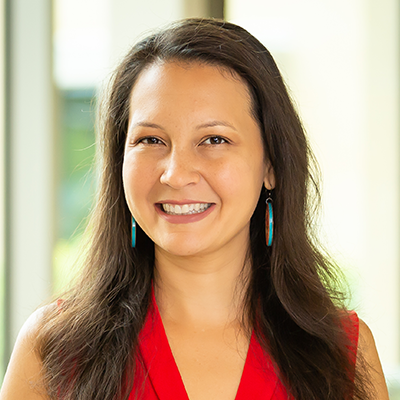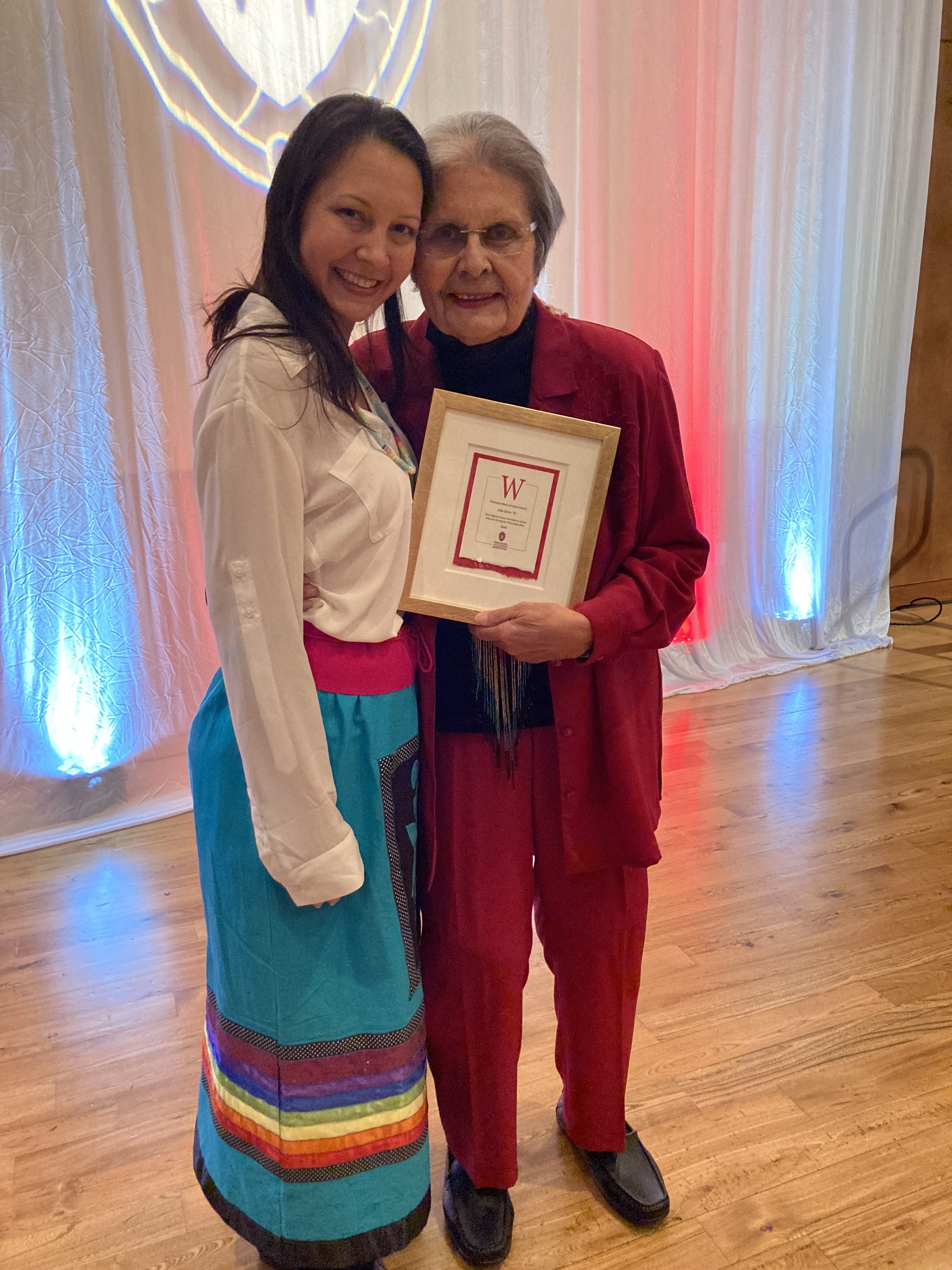An Interview with Dr. Angela Fernandez

Angela Fernandez, Ph.D., M.P.H., LCSW
Pōsōh netāēhnawēmākanak mesek māwaw new weyak. Mamācetowak āēswihsiyan Kenyukīw Angela Fernandez mōkoman eneq āēswihsiyan awāēsāēh netōtāēm (Hello to all my relatives and everyone. My Menominee name is Eagle Woman and Angela Fernandez is my non-Menominee name, and I am Bear Clan.)
My Academic Path
When you were a student, what experiences were most impactful to you in guiding your professional path?
I’m from the Menominee Nation of Wisconsin, so that really shapes my experience. As a student, and now as a professional, my whole path is being rooted in who I am. I know my clan and the responsibilities of my name, and I know my family and community.
I’m a first-generation college student—my big brother was the first to go to college in the family. He invited me and my other brother to visit him, and we got to participate in class, go to a protest, and meet with his professors and the American Indian Student Services staff, who were dedicated to recruiting and retaining and mentoring Indigenous students. After getting connected with that community, one opportunity led to another, and not being afraid to take opportunities, that came from building those relationships and led me to the McNair Scholars Program as an undergraduate, which is when I was able to do research with an American Indian person for the first time. That showed me that research is part of who we are and something we can do.
How did you go about finding your mentors as a student or an early stage investigator?
I met my mentors through the McNair Scholars Program and worked with them at the Indigenous Wellness Research Institute, where I later went on to get master’s degrees and a Ph.D. It really was through building relationships, saying yes to opportunities, and trusting your spirit and letting it guide you. I didn’t have family members to see go through college and the Ph.D.—it happened as a result of taking the opportunities that felt good and right and were aligned with my passions and interests. Building relationships with people and taking the risk of speaking with people who were famous in their field connected me with other people who are part of my career to this day.
Who were your mentors, and what was some of the best advice they shared with you?
I had a number of really great mentors at the University of Wisconsin–Milwaukee and then at the University of Washington with the Indigenous Wellness Research Institute, including Drs. Karina Walters, Tessa Evans Campbell, and Mike Spencer.
One of the pieces of advice was to pray every morning and every evening—to be grounded spiritually and trust that there’s an ancestral connection to knowing your path and being able to listen to that. “Let it flow like water” was another great piece of advice.
These mentors are not only academic mentors but also people who are doing the hard work of taking care of our communities. Ada Deer was a great mentor. She did a lot for restoration and the recognition of our sovereignty as a Tribe that was terminated under federal termination policies in the 1950s. I asked her for some advice when I was going to work for the federal government, and she said, “Don’t fall asleep at the switch.” Be aware, be alert. She was one of very few Indigenous people at the time working in the federal government, and she said she worked as hard as she could, as fast as she could, for as many as she could.
It reminds me of making the most of the privilege and responsibility that we have in our positions. It was so important that my mentors modeled what it looks like to be a mentor, because I am an ancestor in training. I’m trying to embody the things that they taught me so that I can also give the same to younger people.

Dr. Fernandez with beloved mentor and friend, Ada Deer (1935-2023)
My Professional Path
What sparked your interest in working with American Indian/Alaska Native and Indigenous populations, and why is this work important to you?
I was raised in my community, and I know that my responsibility is to honor my ancestors—because of them, I am here today. By protecting our land and protecting our people, our lifeways, for future generations, I’m part of that intergenerational chain. I want to be the strong link in the chain so that I can make more equitable spaces and be part of creating spaces of health and well-being. I’m grateful that my ancestors have done what they’ve done for me to be here today.
Especially with the threat of climate change ahead of us, I think a lot about the importance of doing work that can continue to help tell our stories, share our knowledge, and use that knowledge to address the challenges that lie before us. The Bear Clan were speakers and keepers of the law, peace, and administrative affairs. My name is Eagle Woman, and eagles in many Tribes carry prayers to the creator. As I move along in my career, I think about how I can fulfill my clan responsibilities to be part of working at that structural level to support the work that’s happening on the ground in our communities.
To date, what has been the most exciting research project or component of a research project you’ve worked on and why?
All the community-based participatory research projects that I’ve been able to work on have really been a great honor. One of the most exciting things for me was having the honor of hearing stories. There were a lot of stories of great and significant trauma, but at the same time great and significant resilience and strength, so I was honored that they trusted me to share those stories.
A great example is the Yappalli Choctaw Road. It was an honor to accompany the amazing Choctaw women and families along the Trail of Tears, where their ancestors had walked, and be reminded of their ancestors’ visions of health and survival and thriving for them when they walked on the trail. It really showed me how research can be done in a way that really honors communities’ knowledge in a way that’s sustainable and invited by the community.
Tell us about your current work and projects at the National Institute on Minority Health and Health Disparities.
I get to support potential grantees to address health disparities and inequities in many communities and across health outcomes, and I research where there are gaps in funding and where there’s a need based on what’s happening in the world and in communities. I also really enjoy getting to work across different NIH institutes, within my institute, and with the grantees to support them in the great work that they’re doing in communities.
What were some of the challenges you faced, and how did you overcome them?
I’ve always struggled with not feeling like I belonged, and there was often very little to no presence of Indigenous people, so there was a major difference in the culture that I came from and the cultures that I was living and working with. Pipeline programs like McNair and my involvement with Indigenous research training programs with the Indigenous Wellness Research Institute really made a huge difference. I could see people who understood my experience and were passionate about similar issues, and many of the colleagues and friends I made are still colleagues and friends today. I’m grateful for the opportunities people introduced me to at each step, which showed me that I have a responsibility to make the most of those opportunities and help others in the way that I had been—and still am—helped throughout my career.
The Path Ahead
Are there areas of research that you would like to see more applications submitted in and/or create initiatives for?
Before I came to the federal space, I was doing research on Indigenous peoples and land-based healing, including traditional ecological knowledge, planetary health, and climate change—interventions that center Indigenous knowledge and can inform the ways that we address health disparities in our communities. That’s not my interest alone; it’s a strong interest within the community. This work has always happened in our communities from time immemorial, but those activities are now being recognized and funded in academic and federal spaces.
What advice would you share with a student who is aspiring to work in community and population sciences?
For anybody who is working to benefit any other living beings, the important thing is knowing who you are and where you come from and what that means in relationship to the people and communities you want to work with.
Relationships are at the center of health. Whether that involves humans or more than humans—which, in our communities, is what we sometimes call animal people, plant people, mountains, or water—it’s important to know who you are and walk with humility, walk with respect, and walk side by side and in partnership. Honor and respect the knowledge and leadership of the communities that you work with and know that each person has great responsibility and power.
What words of advice would you give your younger self about school, career, or community engagement?
Don’t be discouraged, do your best to work hard toward what you love, and trust your spirit—trust your ancestors and the guidance that you feel inside of yourself that comes from who you are and who you’re meant to be. Stay focused on your own path, because each person has their own path and each person’s path is equally important.
How do we encourage the next generation of scientists?
All of us are scientists. We are all born very curious, and our natural development is to experience what is around us, embrace it, and ask questions about it. Science is in us.
It’s like a language, and there are many ways to teach it and learn it. Just because we didn’t have a certain opportunity or we have a different learning style from how it’s taught, it doesn’t mean that it’s not in us.
But it takes a lot of hard work, courage, openness, and humility to engage in that work. Science opens our mind to how vast and complex and beautiful life is. The more we learn, the more we realize we don’t know. That is very humbling and very exciting because you have a lifetime of work to do, and you have to encourage the next generation.
My mentors have modeled what it means to be a scientist: honoring past generations of knowledge and being a good ancestor scientist for future generations. That’s something that I am learning to do now as an elder in training, and I think I’m always going to be working on that.